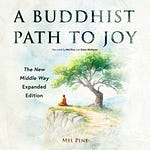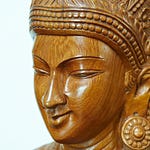Be careful.
The moment you start talking you create a verbal universe, a universe of words, ideas, concepts and abstractions, interwoven and interdependent, most wonderfully generating, supporting and explaining each other, and yet all without essence or substance, mere creations of the mind.
Words create words, reality is silent.
Billions and billions of words have been spoken and written to help guide people toward a state that can’t be described in words—enlightenment. Billions and billions of words have been spoken and written about upādāna—the Pali and Sanskrit word for the clinging and grasping that divert people from reaching enlightenment.
Getting lost in all those words is a prime example of upādāna. That’s true wherever we live and whatever our ethnicity, but for those of European ancestry who live in the West, we love our words and either/or logic. We want answers, not questions. We want the truth to be either this or that.
One prayer used in Vajrayana Buddhist practice expresses an aspiration to “precisely determine” the meaning of the teachings we practice. Another aspires for “confusion itself [to dawn] as primordial awareness.” By not choosing between the two, by accepting both aspirations, we gain experiential—not conceptual—learning and wisdom.
If that last sentence leaves you scratching your head, you’re not alone. It took me more than three decades of meditation and guidance from inspired teachers to begin to gain experiential wisdom. As one of my teachers, Lama Surya Das, has said:
The scarcest human resource is wisdom.
I began writing this post with a different destination in mind, but I realize now that fewer words are better, and this is a good time to begin a period of meditation. So, I’ve turned this into a podcast with guided meditation and periods of silence. In the broadcast industry, they call that dead air, but silence has a beautiful life.
So, please find a comfortable, quiet spot and relax in whatever position you prefer for meditation.
You might close your eyes and find your pure awareness. In a moment, I’ll ring the bell of mindfulness three times. See if you can listen each time from that place of pure awareness, listening until the sound fades.
…
Now, you may open your eyes if you like while remaining in that pure awareness, which is now taking in sights as well as sounds. You’re not evaluating what you’re seeing and hearing, just allowing it to be.
…
You’re also aware of the sensations in your body, especially where it makes contact with whatever you are sitting, lying, or standing on.
…
Now, see if you can bring your breath into your awareness, what it feels like as enters your body through your nose, travels to your lungs, and then leaves via your mouth.
…
You are accepting all of this as it is. No need to do anything. No need to change anything. The breath comes and goes as it pleases. Sensations come and go as they please.
…
Can you bring your thoughts into your awareness along with these sensations? Again, there’s no need to judge or change them. Allow them to be. We’ll take a longer period of silence now for us to rest in that pure awareness, without judging anything, including ourselves. If we lose our way, we nonjudgmentally return to awareness.
…
…
…
I’ll ring the bell of mindfulness three times to end the podcast, but please consider continuing to enjoy the silence.
NOTE: I will donate 100% of my net subscription income from Substack for December to the charity GiveDirectly. If you are considering a paid subscription, now is the time. All subscribers to From the Pure Land, free or paid, receive the same content, but buying a subscription helps with my expenses, which now run more than twice the subscription income.
I’m grateful to all readers, but by subscribing now, you can express your generosity and contribute to my mission and GiveDirectly’s.
From the Pure Land has thousands of readers and subscribers in 35 U.S. states and 19 countries, and the podcast has thousands of listeners in 48 countries.
The Buddha emphasized the joy of giving. Dana is not meant to be obligatory or done reluctantly. Instead, dana should be performed when the giver is “delighted before, during, and after giving.” —Gil Fronsdal.
Consider being delighted by paying for your subscription even though you’ll receive the same content as those with a free subscription. For $5 a month or $50 a year, you’ll be contributing to Mel’s expenses.
Make a one-time gift of any amount.
Share this post with a friend.
Listen and subscribe to the From the Pure Land podcasts via your favorite app or by clicking here.












